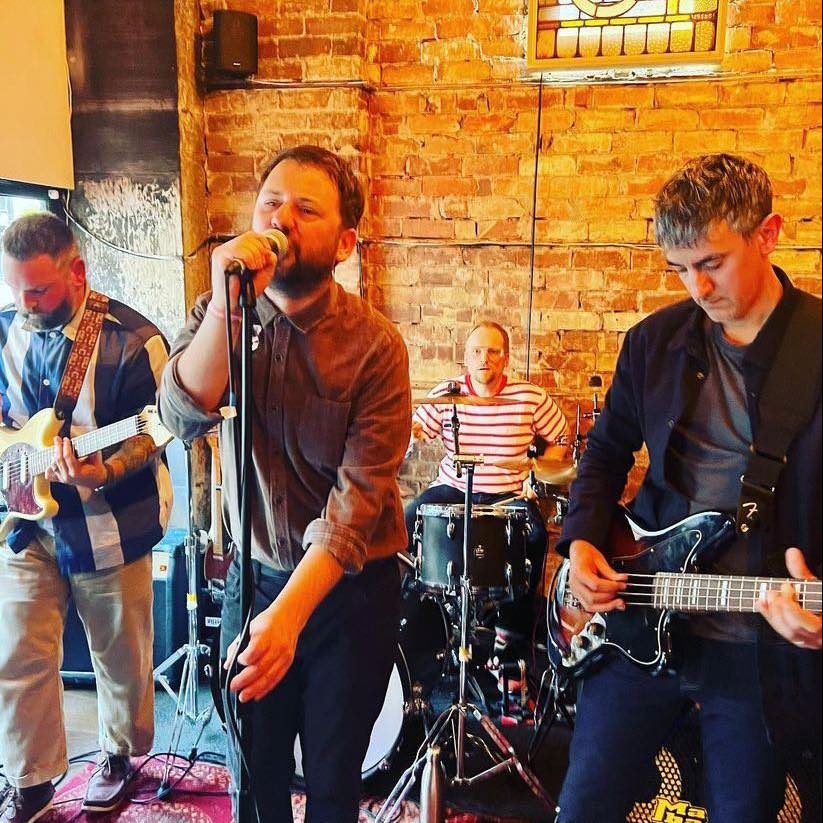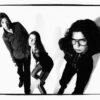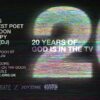For a band that have barely been active for a year, Bored Marsh have been causing a fuss. Two singles down now, it’s still very early days, they haven’t played a gig outside Nottingham but there seems to be a certain je ne sais quoi.
For a band in such an embryonic state, let’s start at the very recent beginning.
“There’s a shopping centre in Nottingham built in the ’60s called the Broad Marsh, so it’s a play on words with that. People from Nottingham will know. Outside of Nottingham, it will mean absolutely nothing, it is just two words that kind of work together. I was on holiday in Lanzarote and my Mum had given me a book of poetry and short stories my late Grandfather had written, and he’s on a bus in the northeast and he refers to the broad marshes. He’d have recognised the reference to the shopping centre. It’s an eye sore on the way out of the city centre to the station, it’s half-demolished but Nottingham City Council are in £50 million of debt so they can’t do anything with it. Although they have just released plans to make it a green space”.
For an unsigned band with no backing, they are making waves early doors. The first single ‘The Grind’ is an urgent, gothic post-punk song with pop melodies and sensibilities and recent second single ‘A Better Way (Don’t Start)’ is an intense, powerful, and dark track with layers of depth and heart that was written about the beginning of the invasion of Ukraine by Russia. They formed out of other bands in and around Nottingham a few years ago and two of them are still in ’90s cover bands.
“When we got together, I didn’t know the other guys apart from Brad, the guitarist and main songwriter. We worked briefly together in a clothes shop in Nottingham 10-15 years ago, not for very long, but we had similar tastes in music, and he had been in bands with Jade the bassist and Paul the drummer before, but I didn’t know them. Apart from Paul, we’re all from Nottingham. We recorded the first two singles in JT Soar. Phil (owner of JT Soar) went to my old school; my Mum taught him English. Sleaford Mods have done most of the vocals for all their records there. They’re really sound guys. Bring your own booze, they’ll let you in if you’re struggling for money. They put on loads of local and touring bands. I think it is only a 50-capacity though. We’ve not done a gig there yet. I was talking to Phil the other day saying we would be up for it if we could fit it in, but we have got a few coming up”.
As a band with more experience than your average upstarts, the influences are broad and varied. Joe has an eclectic set of artists he looks up to.
“I guess as a singer, I sang for a band for about 14 years called The Wickets and did several self-release vinyl records when we were 16-17 and it was Ian Curtis, Iggy Pop and David Bowie as frontmen and singers. Musically, The Stooges, Radiohead, Black Rebel Motorcycle Club, and The Strokes. I worked in a record shop from being 16 in 2002 to 2009 in Selecta Disc, and you watched people seeing what they were buying and you took turns with six or seven other people putting albums on, so you listened to so much music, New and old, it was great. The most important thing for me when seeing frontmen and women is the delivery; for me, it is more important that they mean what they are singing and coming across than singing something really intellectual and deep but in a very distant way, so for me, live, I am fully in the zone, as they say. Maybe if you do 300 gigs a year that starts to wear off. I am not the biggest Sleaford Mods fan, but Jason’s delivery is such a big part of it. Even a pop singer like Sia – her delivery, the soul – she is above so many singers. I prefer that to so many others. Laconic delivery. Although I do actually like Alex Turner’s style now. Someone like Julian Casablancas gives it some. He might not run around the stage but he is giving it some.”
His first foray into bands came, like so many others, with the band at school.
“I moved schools when I was 15 and was what was called a ‘greb’ in my Nirvana hoody and spiky hair and these guys were forming a band, they had two bassists and two drummers but no singer so I thought I would give it a go. In my old band, it was one of those bands where we had our own practice studio but the guitarist was turned up to 11, and the drummer had the biggest bass drum you’d ever seen so I was constantly battling to be heard, having to scream, not like a hardcore metal singer, but just to make yourself loud enough. So I did that for a while but then you realise it’s not sustainable so you try different ways of delivering your voice without ruining it. Then that instinctively evolved into a kind of Ian Curtis kind of style, to get that power. The first two tracks we have put out sound like that, some of the other songs are quite different, with more delicate parts and sound different vocally. It is interesting hearing the references to Editors, I do know a few of their tunes but had never seen them until Glastonbury or bought an album or even listened to one. But I can see the references now”.
Even in such a short time, Bored Marsh have evolved their sound, as they play live and write together, they’ve moved on from where they began.
“When we first started we were more early ’80s, post-punk, dark sound but more recent stuff we’ve written, they’re more upbeat, some slower, but quite a few faster, I don’t think post-punk describes us now, more alternative rock like Radiohead, and modern bands like DIIV. When people keep saying you sound like Editors you can’t say that you don’t. I do try to keep a list of bands people say we sound like. I guess reverb is a big part of sound in terms of guitars and vocals. We go and see bands together like DIIV last year so there are those influences, but song-wise it’s more traditional structures and melodic hooks.”
As with all songwriters and lyricists, you start with what you know, and that inevitably involves love, loss, and grief and writing is often an automatic reflex to get those feelings out. Then something from the bigger, wider world happens.
“’A Better Way (Don’t Start)‘lyrically is about the invasion of the Ukraine basically. A lot of the songs I write have metaphors that ultimately come back to love and life. I have had a pretty shit few years around relationship breakups and grief so a lot of the songs I write come back to that. At the time we wrote it Russia had just invaded and I had a lot of things going on myself but then this terrible thing happens and the things you are dealing with pale in comparison. I don’t feel ‘woah is me’ I am going to sing about me. It isn’t that complicated. There’s a better way to go about this, if you start you’re going to struggle to stop, that’s the problem with war. So it isn’t the happiest song, although there is some hope in there.”
The process of writing has changed as their situation has. From enforced isolation to freedom.
“Brad writes the base of most of the songs. We got together in lockdown so we’d share ideas on What’s App, he would record on Garage Band and he’d send a clip. Originally I was sending vocal ideas back to him before the other two joined and now we will bring ideas to the studio or send them in advance and work on them in the studio. My vocals and melodies are off the cuff trying things out whilst trying to get to grips with the songs and then the lyrics are at the end for me, a lot of it is getting the melodies and song structures together and often the vocal ideas will come out in the process and then that’ll create a theme or idea or feeling that at some point further down the line I sit down and I think I need these lyrics nailed down now. There are still songs we play live now where lyrics aren’t the same from gig to gig which is always how I have done it. There comes a point in time when you have the finished article. It’s good to try things out at gigs and get a feel for them before they become the end product.“
Over the years of being in various bands and releasing music on different mediums, the landscape has swung back and forth. Streaming is the norm. But as we know, this isn’t really of any benefit to the artists, especially new grassroots bands.
“For me, I had a few years out of band so it’s changed significantly. There are pros and cons. You can get your music out to more people on streaming. My old band only released on vinyl, not even put CDs out let alone streaming, which was kind of cool at the time, but in terms of reaching people you weren’t getting that reach. I looked at our Spotify account and the places and countries where you see people who are listening is mad. That wouldn’t have been possible 10 or 15 years ago. But you have to do a lot of work with PR and Promo. To push a single, you have to do a lot of work and in hindsight, the middle of the summer isn’t the best time as a lot of the industry are going to festivals every week. I am learning as we are going, but based on the singles, the response we’ve had considering we don’t have a big team or anything has been really good, the comments, the feedback the people writing about it, have been really good. We want to push on from here, see where we can get to. There are things we want to do, places we want to play and festivals we want to do, so hopefully we can get there.”
One of the most striking things about the two singles so far is the production value. It pulsates with the intensity of a band who paid as much attention to the mixing and mastering as the recording itself. The sense of space for each instrument to breathe and be is palpable.
“We were heavily involved, we’d only booked two or three days to do a few tracks, which you think you will be able to do and then you get to the end of the second day and you start playing around, and you think ‘we’re going to come back next week’ and we went back two or three times as we wanted to be involved in that process. You sit there and try not to have an opinion but then people start talking about it you want it to sound like you. We had certain ideas about how things were panned, and certain references like an Echo and the Bunnymen song we kept coming back to around the mix of it. We’d share ideas with Rich as he was mixing. It worked really well. Rich was able to send it via email, so we could listen to it on the stereo, in headphones, in your car, and there were certain mixes that worked in one place but not the other, so we did quite a bit of going back and forth, which was worth it for the final mastered track but you think at the time ‘are we being ridiculous?’
At one point we thought would run the second single with the same settings and levels as ‘The Grind’ but it needed mixing on its own, maybe mastered to a similar level, but mixing needed to be different for each song. I hadn’t realised the limits Spotify put on volume and quality of songs compared to others. Backing vocals are important to us and you can lose that on certain systems, especially headphones, so hopefully the balance comes across. That was one of the niggles was getting where the vocals sat in the mix right.”
The next stage is to branch out of gigs so close to home, but starting with two support slots in Nottingham.
“We have two exciting gigs at The Chameleon, one with New Candys and one with The Warlocks which, for me, is a pretty big deal. I was in Copenhagen and they played at a dive bar while I was there. We haven’t played a huge amount, maybe six or seven. It’s about trying to find the right opportunities. We want to put our own headline gig on but also sort out some out-of-town gigs and some festivals for next year as well. We want to get into the studio to do some recording by the end of the year. We’d love to do an album but it’ll probably be three or four tracks.”
In the aftermath of speaking to Joe, ‘The Grind’ appeared on Made In Chelsea which came as a huge surprise. Hopefully, this can spread the word even further to a whole audience they weren’t expecting to be exposed to.
As the music industry continues to evolve and become more insular and greedy, starting out again later in life with all the young shit-kickers about can be daunting but it can be a new lease of life. That edge of experience, they’ve done it and the t-shirt is in the bottom of the drawer.
There’s a better way to do it, there’s a better way to start.




